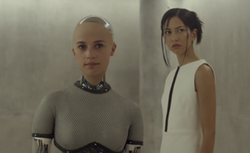 |
| Though Ex Machina's Nathan, king of technology, has a different coloring, his build resembles Henry VIII |
 |
| Nathan and Caleb are performing their nerds' version of this. |
It's also about being God. Nathan, who is an obnoxious though very smart egoist, is enthralled by Caleb calling him God, though Caleb repeatedly corrects his employer with what he actually said, which was that the ability to create actual artificial intelligence would be "like a god, not God." As Caleb is all about the semantics of everything, mechanical and human, this is an essential difference of definition, but Nathan is going with God being himself, thank you, because he's smarter than everyone else.
Which brings us to the title of the film, Ex Machina, from Deus ex Machina, drama's god from the machine . . . .
Does the capacity to create a fully, independently functional, self-aware, artificial consciousness of free will make the man God? Then we must think, "God is dead," and has been dead a long time before the present of this film. Our tech-obsessed society killed God, putting the mechanically built God in humanity's God's place.
It is a commonplace that (male) humanity kills its father-God. But what have females done with fathers and God, other than serve?
Beyond, or below, God, there are many question thrown up by Ex Machina, via the very smart scripting and photography, particularly about what makes up gender, at least of what qualifies as the feminine and the female -- and even, as we see by the still above, ethnicity. These are the questions most critics and reviewers have focused on, though a quick google-through will show they don't all agree on what those questions about men and women are, or what they signify.
Ex Machina, so say the critics, is a movie about ideas, in the best traditions of science fiction, as well as a magnificently constructed and photographed film. So it is, and thus I went to see Ex Machina again this week. It was a sparsely attended late morning screening; all the audience with the exception of two elderly out-of-town hetero couples and me, were white men between the ages of 20-something and mid-30's. In the meantime mothers and fathers of all colors and heritages and ages were streaming into the theater down the corridor, young kids in tow, to see Avengers: Age of Ultron. If anyone were to ask, I'd suggest instead of Ultron, Ex Machina, anytime -- if the questioner is older than 11.



4 comments:
The movies Her, Lucy, Under the Skin (incidentally all three featuring Scarlett Johansson as the female disturbance of the Force) and the television series, Orphan Black, are an interesting contemporary cluster of dramatic screen releases, to which Ex Machina belongs. Why these particular dramas, why now?
Despite having I'm not sure titles such as A Girl Walks Home Alone at Night and Let the Right One In belong with the above title though, because they are out-and-out vampires, whereas Lucy is a mutation and Under The Skin's central figure is an alien, by which the 'feminine' and the 'female' are under scrutiny.
I'm going to be watching HER again very soon (in between indexing, surely one of the most horrid jobs involved with the writing-and publishing of a book!), to check again the conclusions I came to about what the film was saying about men's expectations of entitlement to the perfect woman, when they themselves are probably less than 4's on their own scale of desireability. Of course, it's not only men in HER who are convinced of their entitlement to the hottest and most successful partner, no matter how mediocre they themselves are, but the focus is on the lead who is male.
The differences between HER and MACHINA are more and less subtle. But what the two have in common is striking, because it's the very smartness of the script, and how the writer-director gets to have things both ways -- exploiting the sexualized feminine -- even, as with HER, not having a body of the primary feminine present at all -- while negating it in favor of the feminine's own agency of action.
It's difficult not to think of all these films as in dialogue with each other, even rather knowingly by their creators.
Whedon's Buffy the Vampire Slayer girlfriend and Buffy bots should be considered as well as the girlfriend bot in Serenity - Firefly.
Post a Comment